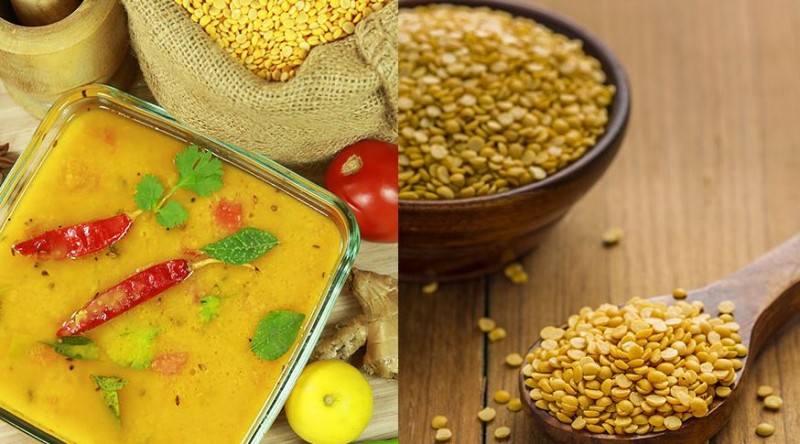
Arhar dal, also known as split pigeon peas, holds a special place in Indian cuisine. It is an essential component of the Indian meal, often served alongside rice, vegetables, and roti (Indian bread). Arhar dal is highly regarded for its nutritional value, as it contains protein, potassium, carbohydrates, sodium, fiber, magnesium, iron, and calcium. These nutrients are not only delicious but also contribute to overall health. However, despite its numerous benefits, some individuals may need to exercise caution when consuming arhar dal due to certain health conditions. In this article, we will explore the health benefits of arhar dal and the potential risks associated with its consumption for individuals with specific health concerns.
Health Benefits of Arhar Dal:
Rich Source of Protein:
Arhar dal is an excellent source of plant-based protein, making it an essential dietary component for vegetarians and vegans. Protein is crucial for tissue repair, muscle development, and overall growth. Including arhar dal in your diet can help meet your protein requirements and promote muscle health.
Potassium for Heart Health:
Potassium is an essential mineral that plays a vital role in maintaining heart health. Arhar dal contains a significant amount of potassium, which helps regulate blood pressure and reduces the risk of hypertension and cardiovascular diseases. A potassium-rich diet is essential for a healthy heart.
Carbohydrates for Energy:
Carbohydrates are the body's primary source of energy. Arhar dal provides a steady supply of complex carbohydrates, which release energy slowly, keeping you feeling full and energized for an extended period. This makes it an excellent choice for sustaining energy throughout the day.
Dietary Fiber for Digestive Health:
Arhar dal is a good source of dietary fiber, which aids in digestion and prevents constipation. Fiber adds bulk to stool and helps it move through the digestive tract more efficiently. It also supports a healthy gut microbiome, which has a positive impact on overall well-being.
Magnesium for Muscle and Nerve Function:
Magnesium is an essential mineral that plays a crucial role in muscle and nerve function. Arhar dal contains magnesium, which helps relax muscles, supports nerve transmission, and contributes to bone health. Consuming arhar dal can be particularly beneficial for athletes and those with active lifestyles.
Iron for Blood Health:
Iron is necessary for the production of hemoglobin, the protein responsible for carrying oxygen in the blood. Arhar dal is a source of iron, making it an ideal choice for individuals, especially women, who need to maintain healthy iron levels and prevent anemia.
Calcium for Strong Bones:
While not as rich in calcium as dairy products, arhar dal still contains a notable amount of this essential mineral. Calcium is vital for bone health and muscle function. Including arhar dal in your diet can contribute to maintaining strong bones and teeth.
Potential Risks of Consuming Arhar Dal:
Gas and Acidity:
Some individuals may experience gas and acidity after consuming arhar dal. This is because arhar dal takes longer to digest, which can lead to discomfort, bloating, acidic burps, and gas formation in the stomach. If you are prone to digestive issues, it's advisable to consume arhar dal in moderation or consider alternative dals that are easier to digest.
Kidney Health Concerns:
People with pre-existing kidney conditions should exercise caution when consuming arhar dal due to its relatively high potassium content. An excessive intake of potassium can strain the kidneys and may worsen kidney problems. Consulting a healthcare professional for personalized dietary advice is essential for individuals with kidney issues.
Hemorrhoids (Piles):
Individuals who suffer from hemorrhoids, commonly known as piles, may need to limit their consumption of arhar dal. The protein in arhar dal can be challenging for the digestive system to break down, potentially leading to constipation. Straining during bowel movements can worsen hemorrhoid symptoms, including swelling, bleeding, and discomfort.
Uric Acid Concerns:
High levels of uric acid in the body can lead to gout and joint pain. Arhar dal contains proteins that may increase uric acid levels when consumed in excess. People with a history of gout or high uric acid levels should monitor their intake of arhar dal and consult a healthcare provider for dietary guidance.
Allergic Reactions:
Some individuals may be allergic to arhar dal, experiencing allergic reactions such as itching, hives, or digestive discomfort. Allergies to legumes, including arhar dal, can be challenging to manage, and individuals with known allergies should avoid consuming it.
Precautions When Cooking Arhar Dal:
To maximize the benefits of arhar dal while minimizing potential risks, consider the following precautions when preparing and consuming it:
Thoroughly Wash the Dal:
Before cooking, rinse arhar dal thoroughly under running water to remove any dust, dirt, or impurities. Proper washing helps ensure the dal is clean and safe for consumption.
Soak the Dal:
Soaking arhar dal for about 20 minutes before cooking can help it soften and cook faster. Soaked dal also tends to be easier to digest.
Control Portion Sizes:
Moderation is key when consuming arhar dal, especially for individuals with digestive or kidney concerns. Be mindful of portion sizes to prevent overconsumption.
Arhar dal is a versatile and nutritious ingredient that plays a significant role in Indian cuisine. It offers a range of health benefits, including being a rich source of protein, potassium, dietary fiber, and essential minerals. However, individuals with specific health conditions such as digestive issues, kidney problems, hemorrhoids, high uric acid levels, or allergies should exercise caution when consuming arhar dal. It is essential to maintain a balanced diet and consult with a healthcare professional or registered dietitian for personalized dietary recommendations. By making informed choices and understanding the potential risks, individuals can enjoy the health benefits of arhar dal while minimizing any adverse effects.
India-UAE Sign MoU for Technology Collaboration in Space, AI, and Renewable Energy
Delhi Retains Title of India's Most Polluted City, Patna Follows Closely Behind